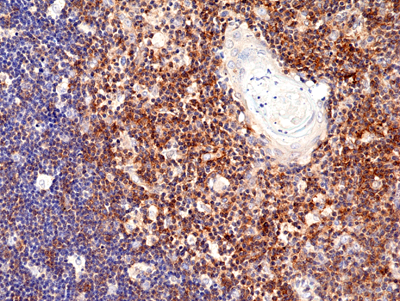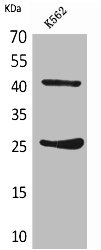
Immunohistochemical staining of formalin fixed and paraffin embedded human liver section using Anti-CD13 Rabbit Monoclonal Antibody (Clone RM403) at a 1:200 dilution.
anti-CD28 (human), Rabbit Monoclonal (RM404)
REV-31-1290-00
ApplicationsWestern Blot, ImmunoHistoChemistry
Product group Antibodies
ReactivityHuman
TargetCD28
Overview
- SupplierRevMAb Biosciences
- Product Nameanti-CD28 (human), Rabbit Monoclonal (RM404)
- Delivery Days Customer2
- ApplicationsWestern Blot, ImmunoHistoChemistry
- CertificationResearch Use Only
- ClonalityMonoclonal
- Clone IDRM404
- Gene ID940
- Target nameCD28
- Target descriptionCD28 molecule
- Target synonymsIMD123, Tp44, T-cell-specific surface glycoprotein CD28
- HostRabbit
- IsotypeIgG
- Protein IDP10747
- Protein NameT-cell-specific surface glycoprotein CD28
- Scientific DescriptionCD28 is a homodimeric T cell specific surface glycoprotein. CD28 is a cell adhesion molecule of the immunoglobulin superfamily which is constitutively expressed on most peripheral blood T lymphocytes. Moreover, CD28 is the critical T cell costimulatory receptor that provides the cell the important second activation signal by binding CD80 and CD86 which are expressed by antigen presenting cells. In addition to its co-stimulation role, CD28 functions by preventing T cells from entering an anergic-hyporesponsive state or from undergoing premature apoptotic cell death. In murine peripheral lymphoid organs and in the blood, all CD4+ and CD8+ T cells express CD28. Diseases associated with CD28 dysfunction include mycosis fungiodes and Sezarys Disease. - Recombinant Antibody. This antibody reacts to human to CD28. Applications: WB, IHC. Source: Rabbit. Liquid. 50% Glycerol/PBS with 1% BSA and 0.09% sodium azide. CD28 is a homodimeric T cell specific surface glycoprotein. CD28 is a cell adhesion molecule of the immunoglobulin superfamily which is constitutively expressed on most peripheral blood T lymphocytes. Moreover, CD28 is the critical T cell costimulatory receptor that provides the cell the important second activation signal by binding CD80 and CD86 which are expressed by antigen presenting cells. In addition to its co-stimulation role, CD28 functions by preventing T cells from entering an anergic-hyporesponsive state or from undergoing premature apoptotic cell death. In murine peripheral lymphoid organs and in the blood, all CD4+ and CD8+ T cells express CD28. Diseases associated with CD28 dysfunction include mycosis fungiodes and Sezarys Disease.
- ReactivityHuman
- Storage Instruction-20°C,2°C to 8°C
- UNSPSC41116161








